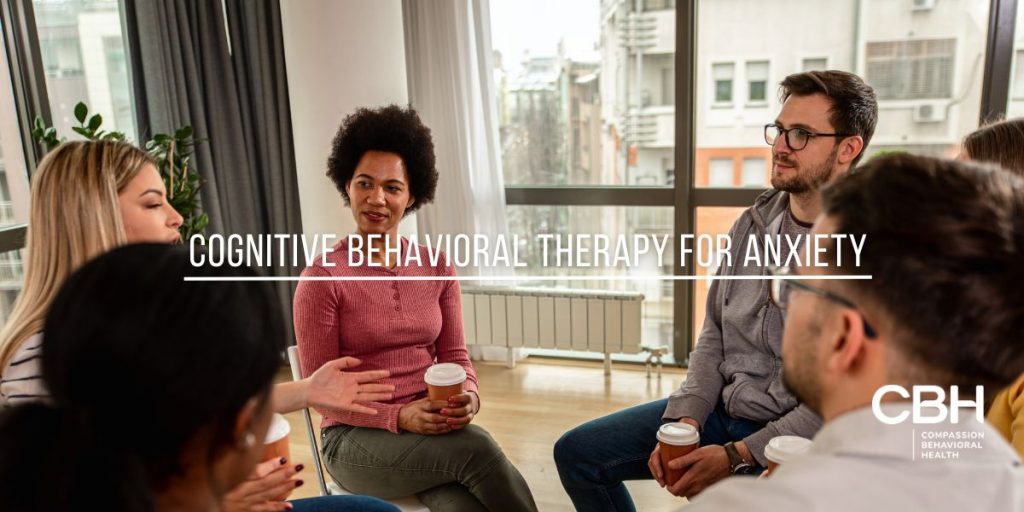Cognitive Behavioral Therapy (CBT) is widely recognized as an effective treatment for anxiety disorders. This article will explore the nature of anxiety, the fundamentals of CBT, and various effective strategies that have proven beneficial for individuals struggling with anxiety. By understanding these elements, readers will gain insight into how CBT can lead to improved mental health and overall quality of life.
Understanding Anxiety and Its Impact on Mental Health
Anxiety is a common yet complex emotional condition that affects millions of people worldwide. Characterized by feelings of worry, fear, or apprehension, anxiety can manifest in various forms and impact an individual’s daily functioning.
Defining Anxiety: A Closer Look
Anxiety is more than just a fleeting feeling of unease; it is a persistent state of tension or apprehension that can interfere with daily activities. It may include feelings of panic, excessive worry, and physical symptoms such as increased heart rate or sweating. The Diagnostic Statistical Manual (DSM-5) categorizes anxiety disorders into several types, including generalized anxiety disorder, panic disorder, and social anxiety disorder.
Individuals experiencing anxiety may find themselves overwhelmed by the stress of everyday life, unable to focus or carry out their responsibilities effectively. It often leads to a vicious cycle where avoidance behaviors only serve to reinforce these feelings over time. For instance, someone with social anxiety might avoid social gatherings, which can lead to feelings of isolation and further exacerbate their anxiety, creating a challenging loop that is difficult to break.

The Mental Health Implications of Anxiety
Untreated anxiety can have significant ramifications for mental health. It can contribute to or exacerbate other mental health conditions, such as depression or substance abuse. Furthermore, individuals may experience disruptions in their personal and professional lives, leading to strained relationships and diminished quality of life. The toll of anxiety can also manifest physically, with symptoms such as chronic fatigue, digestive issues, and even cardiovascular problems, underscoring the interconnectedness of mental and physical health.
Recognizing anxiety as a serious mental health concern can help reduce stigma and encourage individuals to seek help through various therapeutic modalities, such as Cognitive Behavioral Therapy. Additionally, lifestyle changes such as regular exercise, mindfulness practices, and proper sleep hygiene can play a crucial role in managing anxiety symptoms. Support groups and community resources can provide a sense of belonging and understanding, which is vital for those grappling with anxiety, as shared experiences can foster resilience and hope in the journey toward recovery.
The Basics of Cognitive Behavioral Therapy
Cognitive Behavioral Therapy is a structured, time-limited psychological treatment that focuses on the interconnection of thoughts, feelings, and behaviors. CBT is evidence-based and has been shown to be effective for a variety of mental health disorders, particularly anxiety.
The Principles of Cognitive Behavioral Therapy
At the core of CBT is the belief that our thoughts shape our feelings and behaviors. When a person experiences negative or distorted thoughts, they are more likely to encounter negative emotions and stress. CBT aims to break this cycle by encouraging individuals to recognize and challenge their cognitive distortions, leading to more constructive thinking patterns.
The therapeutic process typically involves setting specific goals, identifying problematic thoughts, and developing skills to manage fears and anxieties. Through practice and application, individuals learn to replace maladaptive thoughts with healthier, more accurate interpretations of their experiences. This process often includes cognitive restructuring, where clients are guided to evaluate the evidence for their beliefs and consider alternative viewpoints, fostering a more balanced perspective.

The Role of CBT in Mental Health Treatment
In the realm of mental health treatment, CBT has become a cornerstone due to its practical and goal-oriented nature. By focusing on present thoughts and behaviors, it helps clients gain insight into the underlying issues contributing to their anxiety. This immediacy allows clients to feel empowered, as they can see tangible progress in a relatively short period of time.
Therapists often incorporate various techniques to enhance the delivery of CBT, such as:
- Journaling and tracking thoughts and feelings
- Role-playing scenarios to practice coping strategies
- Developing exposure hierarchies to gradually confront fears
Additionally, CBT can be adapted for group settings, where individuals can share experiences and learn from one another, fostering a sense of community and support. Group therapy sessions often create a safe space for participants to practice new skills and receive feedback from peers, which can enhance the learning experience. This collaborative approach not only helps individuals feel less isolated in their struggles but also provides diverse perspectives on coping mechanisms and problem-solving strategies.
Moreover, the versatility of CBT extends to various formats, including online therapy platforms and self-help resources, making it accessible to a broader audience. Many people find that digital tools, such as mobile apps designed for CBT, can complement traditional therapy by offering exercises and reminders to practice cognitive restructuring and mindfulness techniques in their daily lives. This integration of technology into mental health care represents a significant advancement in how individuals can engage with and benefit from therapeutic practices.

Cognitive Behavioral Therapy for Anxiety
CBT has garnered significant attention for its effectiveness in treating anxiety disorders. By addressing the cognitive processes that underlie anxiety, individuals can develop coping mechanisms to manage symptoms. This therapeutic approach not only helps in alleviating immediate anxiety but also equips individuals with lifelong skills to handle future stressors, fostering resilience and emotional well-being.
How CBT Addresses Anxiety
CBT offers a practical framework for understanding and managing anxiety. It emphasizes the identification of automatic negative thoughts and cognitive distortions that contribute to anxiety. Strategies include:
- Identifying triggers and understanding their impact
- Reframing negative thoughts into positive affirmations
- Practicing problem-solving techniques
By utilizing these strategies, individuals learn to reduce the intensity of their anxiety and respond more adaptively to anxiety-provoking situations. Furthermore, CBT encourages individuals to engage in exposure exercises, where they gradually confront their fears in a controlled manner. This process not only desensitizes them to their triggers but also reinforces their ability to cope effectively, ultimately leading to a more empowered mindset.

The Process of CBT for Anxiety Treatment
The treatment process typically involves a series of structured sessions between the therapist and the individual. Each session may include:
- Reviewing progress toward treatment goals
- Practicing newly learned skills and techniques
- Discussing challenges faced since the last session
Over time, individuals may experience a decrease in symptoms, a shift in perspective, and an enhanced ability to navigate stressful situations. Additionally, therapists often assign homework, which might involve journaling thoughts, practicing relaxation techniques, or engaging in activities that promote exposure to feared situations. This not only reinforces the skills learned during therapy but also encourages individuals to take an active role in their recovery, fostering a sense of agency and control over their anxiety.
Effective Strategies in Cognitive Behavioral Therapy for Anxiety
Within CBT, numerous strategies can be employed to help individuals manage their anxiety effectively. Each strategy plays a vital role in transforming the way a person thinks about and confronts their fears.
Cognitive Restructuring: Changing Your Thought Patterns
Cognitive restructuring involves identifying and challenging negative thought patterns that perpetuate anxiety. The process often includes:
- Recognizing irrational beliefs and cognitive distortions
- Gathering evidence for and against these beliefs
- Replacing distorted thoughts with balanced, rational ones
This shift in thinking can significantly alleviate anxiety, allowing individuals to face challenges with renewed confidence. Additionally, keeping a thought diary can be a helpful tool in this process. By documenting anxious thoughts and the context in which they arise, individuals can better understand triggers and patterns, making it easier to confront and reframe these thoughts over time. This practice not only aids in cognitive restructuring but also promotes self-reflection and personal growth.
Exposure Therapy: Facing Your Fears
Exposure therapy is a key component of CBT for anxiety, involving gradual exposure to fear-inducing situations. By confronting fears in a controlled manner, individuals can work through their avoidance behaviors, ultimately reducing fear responses.
Exposure therapy may include:
- Creating an anxiety hierarchy from least to most frightening situations
- Systematically working through each item in the hierarchy
- Employing relaxation techniques during exposure exercises
Moreover, the role of a supportive therapist during this process cannot be overstated. A therapist can provide guidance and encouragement, helping individuals navigate their fears safely and effectively. This support is crucial, as it fosters a sense of security, allowing individuals to push their boundaries while knowing they are not alone in their journey. Over time, as individuals successfully face their fears, they often experience a profound sense of accomplishment and empowerment.

Mindfulness and Relaxation Techniques in CBT
Incorporating mindfulness and relaxation techniques into CBT can significantly enhance the effectiveness of treatment. These techniques help individuals stay present and reduce overall anxiety levels.
Common mindfulness practices may include:
- Deep breathing exercises
- Guided imagery and visualization
- Meditation and yoga
By integrating these practices, individuals can cultivate a heightened awareness of their thoughts and emotions, ultimately fostering greater emotional regulation. Furthermore, the practice of mindfulness encourages individuals to observe their thoughts without judgment, which can be particularly liberating for those who often feel overwhelmed by their anxiety. This non-reactive stance allows for a more compassionate relationship with oneself, paving the way for healing and resilience. As individuals become more adept at mindfulness, they may also find it easier to manage stressors in their daily lives, leading to a more balanced and fulfilling existence.
Dialectical Behavior Therapy: A Complementary Approach to Mental Wellness
While Cognitive Behavioral Therapy (CBT) is widely recognized as an effective treatment for anxiety disorders, Dialectical Behavior Therapy (DBT) offers an alternative framework that is particularly valuable for individuals grappling with emotional dysregulation or high-stress situations. DBT focuses on teaching skills in four key areas: mindfulness, distress tolerance, emotional regulation, and interpersonal effectiveness. These skills help individuals build resilience, manage overwhelming emotions, and improve relationships.
DBT is often recommended for individuals whose anxiety is intertwined with other challenges, such as impulsive behaviors or difficulty navigating complex social interactions. By emphasizing acceptance and change, DBT empowers individuals to cope effectively with life’s demands, fostering a sense of balance and control.
The Benefits of Cognitive Behavioral Therapy for Anxiety
CBT offers numerous advantages for individuals seeking to manage anxiety. From its structured approach to its focus on practical skills, many find it a valuable resource in their journey toward mental wellness.
Short-Term and Long-Term Benefits of CBT
CBT can lead to both immediate relief and long-term management of anxiety. In the short term, individuals may experience:
- Immediate reduction in anxiety symptoms
- Increased coping mechanisms for dealing with stress
- Enhanced motivation to face fears
In the long term, the benefits may include:
- Developed resilience and self-efficacy
- Improved overall emotional regulation and stability
- Decreased risk of anxiety recurrence
The Impact of CBT on Quality of Life
The ultimate goal of CBT is to enhance the quality of life for individuals grappling with anxiety. As individuals learn to manage their anxiety more effectively, they often find improvements in personal relationships, work performance, and overall happiness.

Many report feeling a greater sense of control over their thoughts and emotions, which leads to more fulfilling life experiences. The skills learned during therapy continue to benefit individuals long after their formal treatment has concluded, empowering them to navigate life’s challenges with confidence.
In conclusion, Cognitive Behavioral Therapy represents a powerful tool for those affected by anxiety. Through understanding its principles and employing effective strategies, individuals can work toward overcoming their fears and achieving a more balanced mental state.
CBT for Anxiety Treatment at Compassion Behavioral Health in Florida

If you’re ready to take the next step towards managing your anxiety and enhancing your quality of life, Compassion Behavioral Health is here to guide you. Our personalized approach to mental health and substance use treatment is designed to foster sustainable recovery and help you achieve your highest well-being. Conveniently located in Hollywood, Florida, our rehab center is a beacon of hope and transformation. Call Us Today and embark on your journey to reclaim your life with the support of our expert team.



